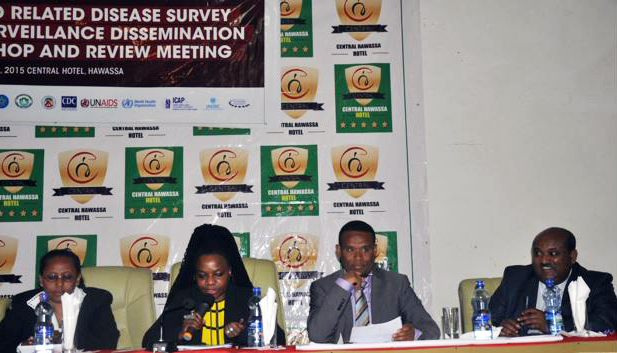Dissemination Workshop held on HIV and Related Diseases Survey and Surveillance

The Ethiopian Public Health Institute (EPHI), conducted a dissemination workshop in collaboration with the Federal Ministry of Health, Federal HIV AIDS Prevention and Control Office, and partners, on HIV and related diseases survey and surveillance from December 10 to 12, 2015, at Hawassa, Southern Nations, Nationalities and Peoples Regional State.
According to the workshop’s organizers, the workshop is conducted to update partners on the context of HIV epidemic in Ethiopia, to share the progress and key findings from HIV related survey and surveillance, to identify data gaps and propose options for HIV surveillance in 2016 and finally to discuss and enrich road maps for HIV, STI and TB surveillance in light of the current global guidance.
Sister Fikrite Abera disease prevention and Control directorate director of the Regional Health Bureau, on behalf of the Southern Nations, Nationalities and Peoples Health Bureau Head, in her welcome address said that, I would like to say welcome you all to Hawassa town and wish you to have a joyful stay.
Dr. Amha Kebede Director General of EPHI, in his opening remarks said that, this dissemination workshop will provide to all of us with the current HIV and related diseases research finding information that helps the national effort of HIV epidemic control programs of the country.
Ato Birhanu Feyissa, Federal HIV/AIDS Prevention and Control Office, Dr. Ashnafi Haile representative of CDC-Ethiopia, Dr.Miriam Maluwa UNAIDS Country Director had also delivered key note address.
During the workshop a panel discussion was conducted on the ”National and Regional HIV estimation and projection”. The panelists were Dr. Yibeltal Assefa Deputy Director General of EPHI, Ato Birhanu Feyissa FHAPCO, Dr. Frehiwot Negatu FMOH, Dr. Ashenafi Haile CDC-Ethiopia, Dr. Alankar Malviya UNAIDS, and Dr. Fekadu Adugna WHO-Ethiopia.
There were also parallel sessions on the revised guidelines for ANC based HIV surveillance and planning, on the revised guidelines for STI surveillance and planning, on the revised guidelines for TB/HIV surveillance and planning, on establishing HARAC, endorsing the HIV/AIDS research agenda and HIV Laboratory service upgrading and planning for 2015/2016 and on revitalizing Advanced Clinical Monitoring (ACM); utilizing the existing data and sample repository, and reinitiating new and future directions.
The work shop has accommodated more than 16 presentations and attracted about 240 participants from Federal Ministry of Health, Federal Institutions, Regional Health Bureaus, Universities and partners.
